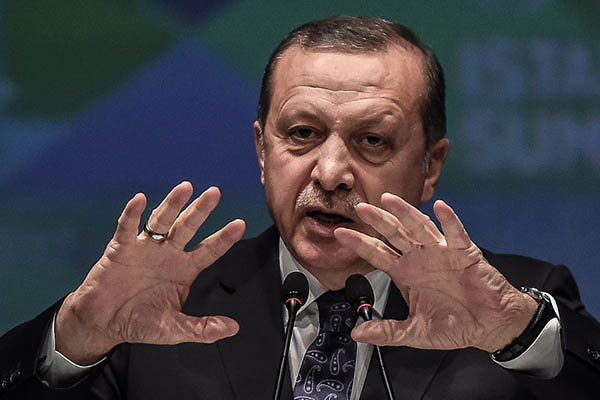
File Photo. Ozan Kose—AFP
Ankara had been accused of complacency toward terror group until it joined U.S.-led coalition in August 2015.
The Turkish authorities have accused the Islamic State group of carrying out the attack on Istanbul’s international airport that killed 41 people.
Long accused of complacency toward I.S., Turkey has changed its approach since joining the U.S.-led coalition against the jihadists in August 2015.
What was Ankara’s policy toward I.S.?
I.S. has long relied on Turkey as a conduit for reinforcements and weapons bound for Syria to fight the regime of Bashar al-Assad, his armed opponents and Al-Nusra Front, the branch of Al Qaeda in the war-torn country.
Turkish President Recep Tayyip Erdogan, a devout Sunni Muslim, openly advocated the downfall of his old ally, his Syrian counterpart al-Assad of the Alawite offshoot of Shia Islam. He therefore supported all components of the rebellion since the start of the conflict in Syria in 2011 that has now killed more than 280,000 people and forced millions to flee their homes.
Why has it changed?
In August 2015, Turkey joined the international military coalition against I.S. which, along with Russia, is mainly targeting the jihadists’ oil facilities, including many fields and wells.
“Strangely, I.S. accuses Turkey of lending support to the YPG [Kurdish People’s Protection Units] and has blamed Turkey—and others—for the loss of territory along the border,” says Aron Stein of the Atlantic Council think tank.
For its part, after having condoned I.S.’s activities, police have been “hitting I.S. in Turkey pretty hard” including raids in Gaziantep and elsewhere. And Ankara announced recently that its forces were shelling I.S. positions in Syria.
Why is Ankara blaming I.S.?
Although no one has claimed responsibility for the attack on Istanbul’s Ataturk Airport, Prime Minister Binali Yildirim said “the evidence points to Daesh.”
According to the Soufan Group intelligence consultancy, “Turkey has become a prime target for the Islamic State in the last year. It has been mentioned several times in the group’s English-language magazine, Dabiq; President Erdogan was featured on the cover of issue 11.”
Turkey also believes that I.S. hit it where it hurts, especially tourism, which brings the country’s economy around $30 billion a year.
Ege Seckin of IHS Country Risk says that “the attack was most likely conducted by the Islamic State to undermine the Turkish economy by attacking the airport ahead of the summer months, when tourism peaks.”
Why isn’t I.S. claiming the airport attack?
I.S., which is normally quick to claim responsibility and reveal gory details of its attacks, has always been discreet when it comes to Turkey. Unlike Kurdish separatists, it has never endorsed attacks in the country except against Syrian citizen journalists.
“It’s unclear why I.S. doesn’t claim credit, but it appears to be part of a broader strategy to exacerbate internal Turkish tensions, ranging from political polarization to the Kurdish-Turkish conflict,” says Stein of the Atlantic Council.
Are they heading for all-out war?
The airport attack could mark a turning point. “If the Islamic State is indeed behind this attack, this would be a declaration of war,” says Soner Cagaptay, director of the Turkish Research Program at The Washington Institute. “Thus far, Turkey has avoided engaging the Islamic State in full war, instead prioritizing its battle against the Assad regime and the Syrian Kurds. For Turkey, fighting the Islamic State as a first order battle could now be unavoidable.”
